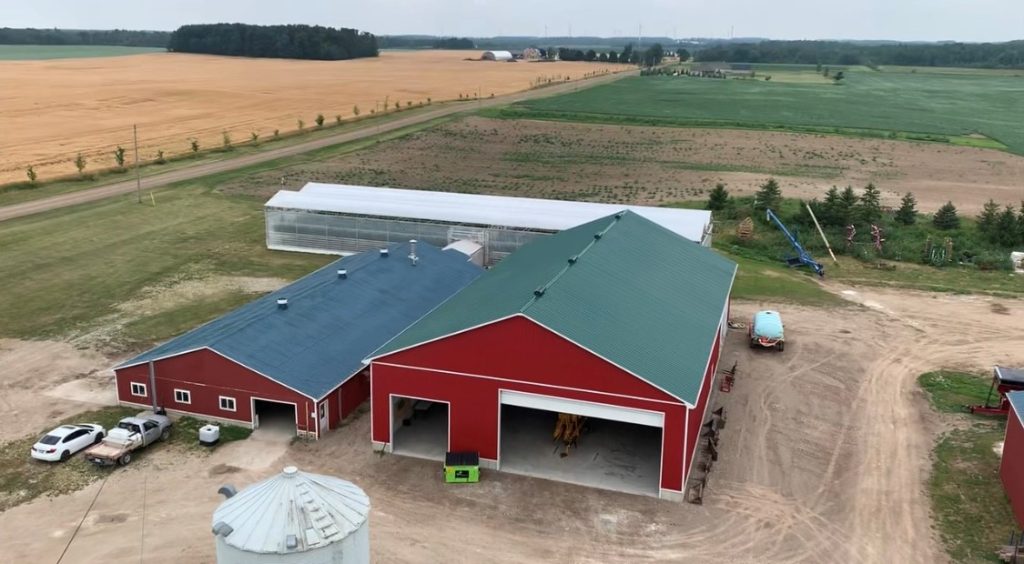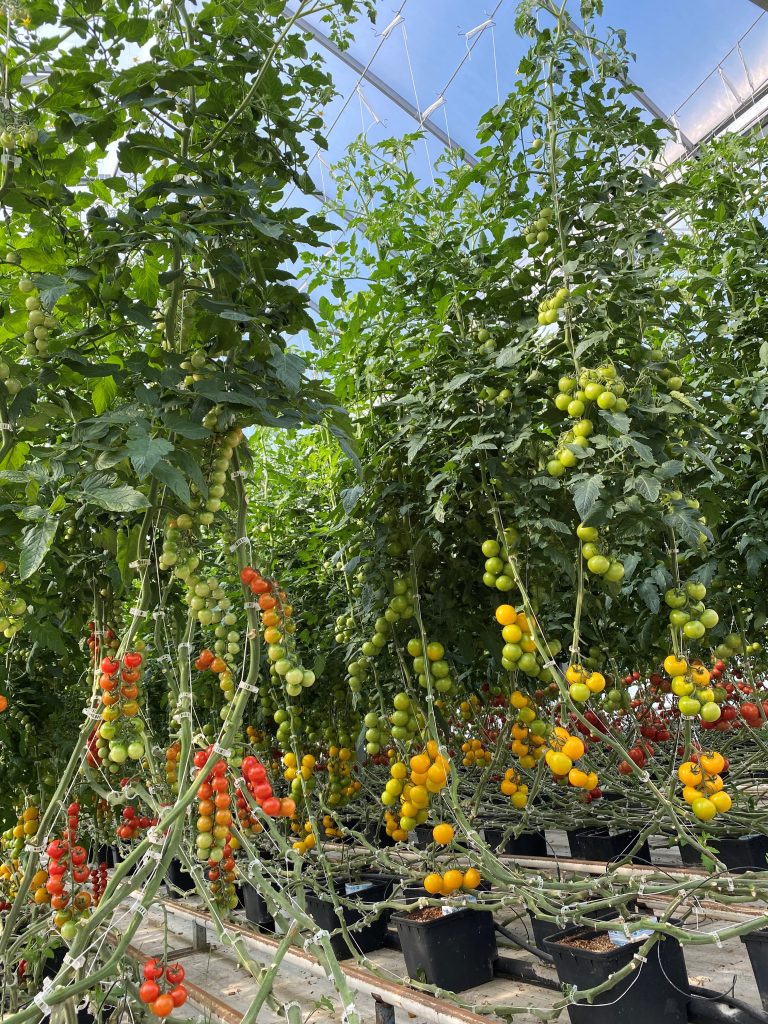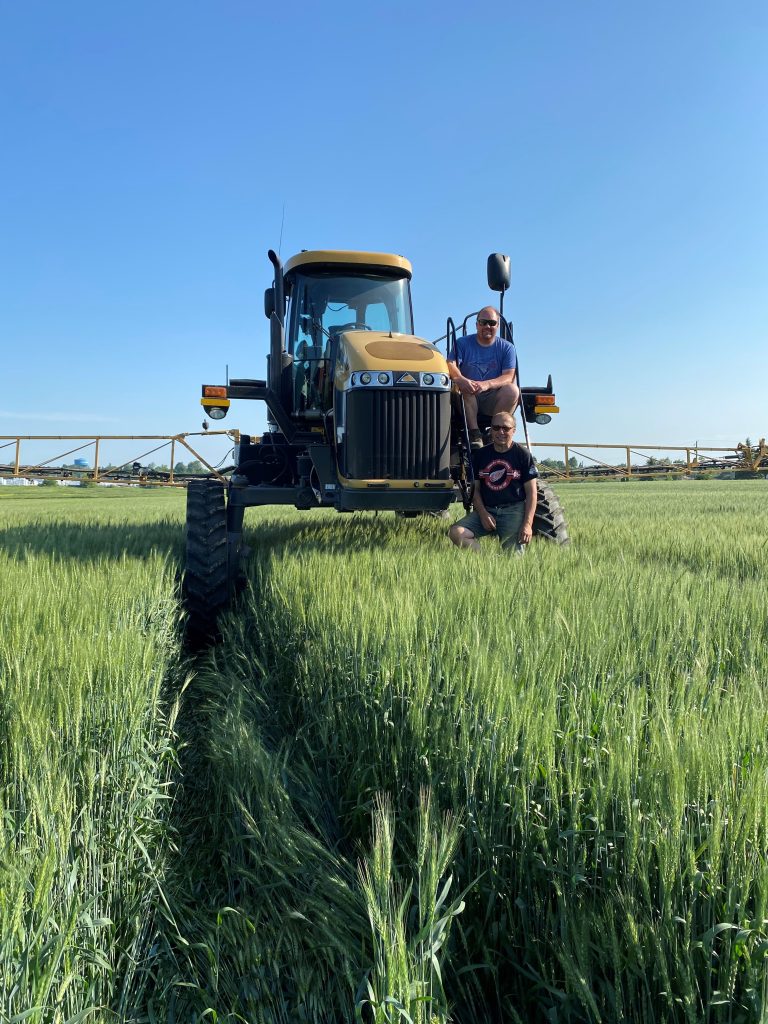Written by Emily McKague
On August 9th, 2022, I had the pleasure of visiting Besley Country Market, on the outskirts of Shelburne. There I chatted with Evan Besley and Amy Blodgett whose family own and operate the farm and market. Throughout the interview their passion for the farm, family, food production, and their community shone. Amy and Evan seemed in a few words: humble, kind, and busy!!
The Operation
Evan and Amy are the fourth generation on their farm. Evan’s great-grandfather purchased the property in 1939 to grow mixed livestock and crops. His grandparents transitioned it into a dairy operation, which his father and uncles continued.
Initially, Evan did not intend to go into agriculture. He attended Laurentian University in Sudbury to study Physical Education, and there he and Amy met. After living away from home for a while, Evan said that he also came to realize that farming was not so bad and in fact he missed it. Finishing his degree in 2009, he moved home to work full time with his parents and opened the market garden aspect of the farm. Evan’s father, Brian, had always thought that a market garden would do well as the farm is located directly on the edge of Shelburne. Both Brian and Evan had more of a passion for crop production than for livestock, and had a vision of providing locally grown food to their community, so they made the bold move to pivot their business. Amy completed a PhD and worked in the corporate world for a number of years. During that time, she worked part time on the farm often taking produce to farmer’s markets on weekends. Last year she transitioned to being full time on the farm and is very glad to have made the change. She spoke passionately about how much she values the opportunity to connect with community members, educating people about agriculture and the significance of fresh, locally grown food. Altogether, the farm cash crops about 2000 acres, producing winter wheat, IP soybeans, corn, edible navy beans, barley and hay. For the market garden they produce three hydroponic varieties of tomatoes (cherry, red cluster, and a low acid yellow tomato) out of a greenhouse, and about 20 acres of asparagus, sweet corn, pumpkins and squash. In addition to their own produce, they sell other products from nearby farms, plus local frozen meats, and home baking and preserves made by Evan’s mom, Deb.
The Market Garden
In an effort to have a core market garden crop with an extended production season, Evan took a greenhouse course in South Carolina in 2010. Evan and his parents then built a greenhouse in 2012, housing 1900 hydroponic tomato plants which produce fruit from mid-May to the beginning of November each year.
In February, the one-foot-tall tomato plants are transplanted into a pot with a customized soil blend that the Besley’s consider to be vitally important. Amy and Evan commented that it took a few years to figure out the right mix to use, and that having the right soil can make or break a greenhouse crop, just like in the field. The greenhouse is quite automated. Temperature and humidity are monitored with sensors, which can automatically open and close the roof, and turn on and off fans and heaters so that the environment stays ideal. The plants are irrigated with nutrients delivered through water, and drain water samples are collected from plants to monitor and adjust fertility throughout the crop’s growth stages. Tomato vines stretch to the roof and are laden with fruit. Evan and Amy pointed out a beehive, explaining that they use bumblebees for pollination in the greenhouse, and the hives are replaced each month as per the bees’ life cycle.
Evan mentioned that keeping the tomato plants well pruned is very important for both plant health and production. With less foliage in the greenhouse, there is improved airflow through the crop, which in turn assists with plant health and disease control. Additionally, the plants end up putting more energy into fruit production rather than maintaining and growing leaf tissue, so they get a better crop.
During the growing season, the Besley’s have two to three part-time employees working in the greenhouse, picking fruit and tending plants, and two in the market stand. Amy and Evan repeatedly stressed how essential their employees are to their business, and how grateful they are for the wonderful staff that they have. They noted that a big part of their business success is due to the quality of their staff, as they help facilitate fruit production and plant maintenance behind the scenes, and deliver exceptional customer service on the frontend.
They emphasized the importance of having staff who are both knowledgeable and passionate about fresh, locally grown food, and who enjoy communicating with customers at the stand. Amy noted that with the Shelburne population rapidly growing, they are meeting more people at their garden market who have recently moved from major city centers and who are excited to learn more about local agriculture and how their food is grown. The education piece is an important part of their business, and Evan noted that you can communicate a lot through a simple conversation. Sometimes it is as easy as suggesting a favourite recipe for a customer to try with their produce, or sharing cooking tips. Sometimes they end up chatting about topics like GMOs or organic foods. The Besleys were enthusiastic about their customers and noted that many of the people who are new to the community and who live near the farm are excited to buy produce that they have watched grow throughout the season.
Most of the Besley’s produce is sold directly from their farmgate stand. However, they do supply some of their tomatoes to other local producers who bring them to various farmer’s markets, and they supply a number of local restaurants as well. In general, their market garden season runs from May right through to October, after which they get a couple months of relative quiet. Evan said that it is usually a sprint through summertime, but after thanksgiving they can catch their breath a little. When asked what happens with any product that was not sold, Evan said at the moment demand exceeds what they can produce. Any produce that starts to turn past its prime does not go to waste – it gets used in Deb’s baking, jams or preserves.
Technology and New Practices
On the cash cropping side of the operation, the Besleys have started implementing cover crops and are trying to constantly improve their practices in that area. Evan said that they will continue to expand their use of covers and want to better match the cover species to soil types of different fields. They have already seen yield benefits to planting them, although he admitted that at the end of the day mother nature always decides how the year will turn out, by the amount of moisture the crops get.
He mentioned that changes to technology are happening quickly in the cash cropping world and noted that just in his generation there have been big advances. Embracing new tech is challenging but rewarding. They use GPS mapping, autosteer and variable rate application in their operation, and they’ve seen yield increases with the adoption of those too. He also pointed out that they are not afraid to ask for help and try to accept and utilize support when available. They work with Holmes Agro Service who he said have been absolutely top-notch about helping them keep ahead of the technology curve.
One of the best decisions they’ve made for their field cropping operation was the addition of on-site drying and storage. They had some bins remaining on the property from the dairy operation and then hired the company Advance Grain Handling to add an elevator and drier in 2019. It has given them the option to hold onto their grain until the off-season when they can get better pricing, and to simplify trucking logistics at harvest time. Evan said that a future goal would be to add additional storage.
Final Thoughts
Overall, Evan and Amy said that jumping into market gardening has been a big learning curve, but the Besley family does not take any of their experiences for granted. As a respected neighbour once told Evan, “It’s a privilege to get to work in the agriculture industry.” Whether they are growing crops in a greenhouse or outside in a field, the Besley family is always mindful of how fortunate they are to get to support and connect with their community through farm fresh food and grain production. They continually strive to utilize best growing practices that serve local needs.
I’d like to thank Evan and Amy for taking the time to participate in the interview. The energy and passion they bring to their business was clear in everything they talked about, and they certainly are excellent spokespeople for the agricultural industry. If you are ever heading through Shelburne and have the time, I’d encourage you to stop by the farm stand to try some of their produce for yourself. As we all know – nothing tastes so good as local food in season, and they are certainly growing it well!





